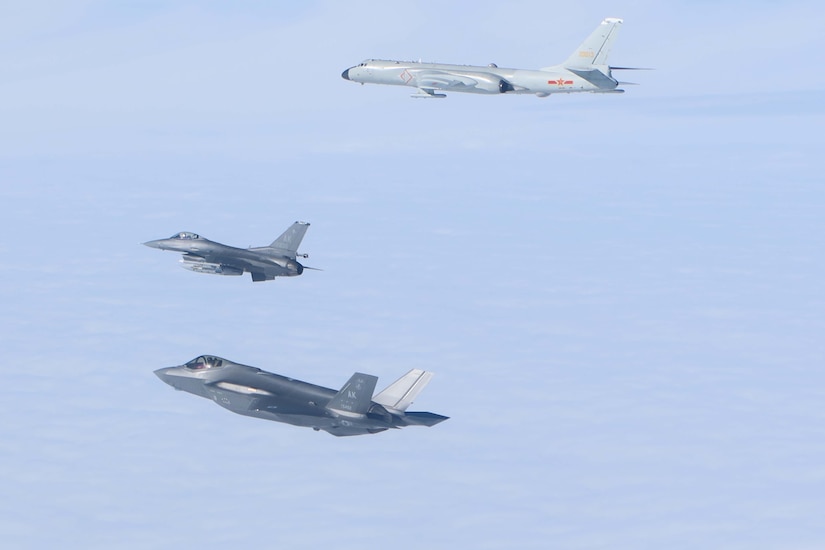A senior Pentagon official has revealed that China is capitalizing on its support for Russia’s war in Ukraine to deepen its foothold in the Arctic, where the two nations have engaged in “unprecedented” military cooperation.
During a discussion at the Center for Strategic and International Studies on November 5, Iris A. Ferguson, Deputy Assistant Secretary of Defense for Arctic and Global Resilience, highlighted Beijing and Moscow’s growing partnership in the region.
She described their recent activities as indicative of a shifting geopolitical landscape in the Arctic, traditionally dominated by Russia.
In the past two years, China and Russia have conducted joint military operations in the region, including joint patrols involving warships, bombers, and coast guard vessels.
In July, the two nations undertook a major air patrol in international airspace near Alaska, with four strategic bombers from both countries flying over the Chukchi and Bering Seas.
For the first time, Chinese and Russian aircraft also launched from the same base in northeast Russia, signaling a new level of operational integration.
Ferguson noted that Russia’s willingness to allow such cooperation changes its Arctic strategy. Historically, Moscow has been cautious about permitting China’s presence in the region, which it considers “one of the crown jewels.”
“From a military perspective, that’s new and unique,” she said. “I also want to really emphasize that this isn’t necessarily an alliance as we traditionally think of it as an alliance.”
The war in Ukraine, however, has left Russia isolated globally, enabling China to gain unprecedented access.
She pointed out that China, which lacks Arctic territory, has long sought to expand its influence in the region, claiming to be a “near-Arctic state.”
The Arctic’s strategic value as a shipping route, a source of raw materials, and a theater for projecting power has made it a focal point for Chinese ambitions.
Ferguson described the evolving partnership as a shift in Russia’s stance, opening new doors for China economically, diplomatically, scientifically, and militarily. Beijing’s Arctic presence, she said, provides the People’s Republic of China with unique opportunities to gain military experience in remote areas.
Arctic Becomes A Battleground For Resources
The Arctic, a largely uncharted expanse, is emerging as a critical hotspot for geopolitical competition due to its wealth of untapped resources, including oil, gas, and marine life. Historically regarded as a potential flashpoint for conflict among major powers, the region’s importance is growing as melting ice opens up new possibilities.
The receding ice has extended the Arctic’s accessibility during summer, intensifying competition among Western nations and Russia for regional dominance. The Northern Sea Route is a key focus, a shipping pathway that could dramatically reduce transit times between East Asia and Europe.
Unlike NATO’s structured alliances, Iris A. Ferguson, Deputy Assistant Secretary of Defense for Arctic and Global Resilience, pointed out that China and Russia lack a formal alliance agreement.
Ferguson said, “We know the years of investment and trust-building and interoperability required to make an alliance – and them flying in circles together is not the same.”
She dismissed China’s and Russia’s recent joint operations as comparatively superficial but acknowledged the need to monitor their evolving ambitions closely.

However, China and Russia have taken steps to formalize their Arctic cooperation. In May, they created a commission to develop the Arctic route, followed by an agreement in August to hold discussions on polar navigation security and shipbuilding.
Meanwhile, the Arctic’s strategic importance is further highlighted by key maritime chokepoints like the Bering Strait, which separates Russia and Alaska. The region has already seen joint Chinese-Russian military operations, including exercises in and over the Bering Sea.
Retired Air Marshal Anil Chopra, an Indian Air Force veteran and frequent contributor to EurAsian Times, argued, “NATO’s expansion northward has compelled Moscow to significantly increase its military footprint. Growing superpower China has shown an escalating interest in Arctic affairs.”
US officials remain concerned that China might exploit civilian research and commercial missions in the Arctic to further its military goals.
In response, the US is exploring ways to strengthen its Arctic deterrence alongside allies and partners. This week, US Air Force B-52 bombers conducted live-fire drills with Norway and the UK, signaling a commitment to maintaining a strong presence in the region.
However, Ferguson stressed that sustaining such initiatives will require increased investment, an area where the Department of Defense has lagged in recent years.
Alaska plays a key role in the US Arctic strategy, housing a fleet of 100 fifth-generation fighter jets and an airborne division capable of rapid deployment. This position supports operations in the Arctic and bolsters US influence in the Indo-Pacific, where it continues to compete with China.
As ice melts, the Arctic’s economic and strategic value is drawing unprecedented attention, setting the stage for intensified rivalry in this rapidly evolving new frontier.
- Contact the author at ashishmichel(at)gmail.com
- Follow EurAsian Times on Google News




